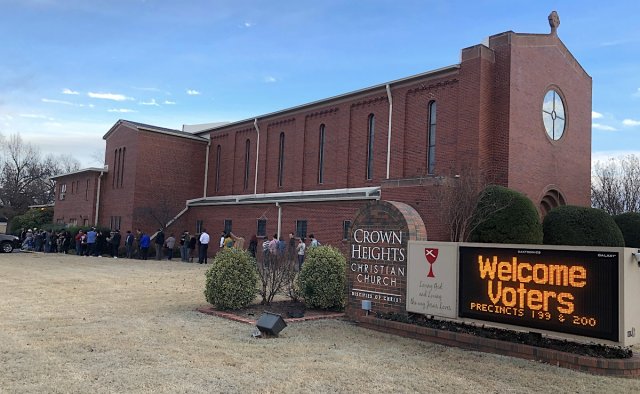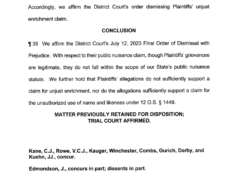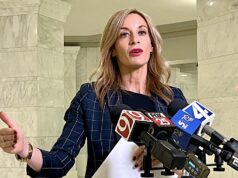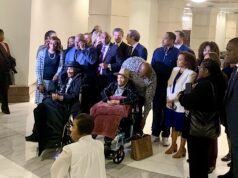

In a 6-3 decision, the Oklahoma Supreme Court has struck down a requirement that absentee ballots be validated by a notary of the public. The Oklahoma chapter of the League of Women Voters had challenged the requirement in an effort to ensure ballot access during elections potentially impacted by the COVID-19 pandemic.
The brief majority decision, authored by Chief Justice Noma Gurich, found that the Oklahoma State Election Board must accept alternate affidavits outlined in Title 12, Section 426 by the Oklahoma Legislature in 2002. Joined by Vice Chief Justice Richard Darby, Justice Yvonne Kauger, Justice James Edmondson, Justice Tom Colbert and Justice Doug Combs, Gurich wrote that the Election Board’s notary requirement for absentee ballots was not covered by exemptions to the 2002 affidavit statute.
“Therefore, respondent is directed to recognize affidavits made under the provisions of Section 426 in the context of absentee voting,” Gurich wrote. “Respondent is further ordered to send absentee ballot voters such forms, instructions and materials as will facilitate the use of [the alternate affidavit statute]. Respondent is barred from issuing ballot forms, instructions and materials suggesting notarization and/or a notarized affidavit form is the only means through which the requisite affidavit for absentee voting may be accomplished.”
In one of two dissenting opinions, Justice John Kane and Justice James Winchester wrote:
I conclude that our existing statutes do not provide the relief proposed by the petitioners, so the issues stand presented to the wrong branch of government. I dissent.
New Supreme Court Justice Dustin Rowe issued his own dissent, calling the resultant change “absurd.”
“Considering the history of voter fraud, the specifics of our absentee voter process and recent legislative history, I agree with the respondent that it would be absurd to now open the gates and provide for no verification for absentee ballots but still require in-person voters to provide a valid I.D.”
A group called Let Oklahoma Vote that had supported the legal challenge to the notary requirement issued a statement about the court’s decision this afternoon.
“I am very grateful to the Supreme Court,” said Peggy Winton, one of two petitioners in the case. “This is a victory for every Oklahoma voter who wants to exercise the right to vote but not risk their lives to do so.”
Winton identified herself as a cancer survivor with a compromised immune system in the press release.
“I joined the lawsuit because I believed this was a simple change that will save lives,” Winton said. “Today, the court’s ruling will allow Oklahomans with compromised immune systems like me to vote safely without having to leave our homes for an unnecessary notarization that does nothing to protect the integrity of the vote.”
Information about notarization in Oklahoma law is posted on the Secretary of State’s website. Those interested in requesting absentee ballots can do so by visiting the Election Board website.
Legislature advances bill to reinstitute requirement
Two days after the Oklahoma Supreme Court’s decision, the House of Representatives voted 74-26 to advance SB 210, which was amended to address the statutory gap referenced by the court. Functionally, the bill would require absentee ballots to be notarized for elections in 2021 and beyond. It includes provisions for 2020 when an election occurs within 45 days of a health emergency declaration related to COVID-19. In that instance, a photo copy of a valid state-issued license featuring the voter’s picture — such as a driver’s license or a medical marijuana card — would suffice as proof of identity.
House Democrats questioned Rep. Chris Kannady (R-OKC) for hours, ultimately debating and voting against the bill. Kannady said the bill was requested by the director of the Oklahoma State Election Board.
Rep. Jason Dunnington (D-OKC) distributed a statement after voting against the measure.
“Within hours of Oklahomans gaining easier access to vote by mail, some of the most powerful members of our Legislature started taking it back,” Dunnington said. “The Oklahoma Supreme Court rightly affirmed we do not need a notary requirement for voting by mail. The next day, Republican leaders scheduled a vote to make sure that decision was undone. Adding insult to injury, they added another unnecessary burden: requiring a photocopy of an ID.
“Rules like these don’t secure our elections; they just make participation even harder. Elections are how we hold our government accountable and participating in the election process must be simple, straightforward, and most importantly, accessible.”
Kannady released his own statement.
“Oklahomans have said they want elections secure and free from fraud,” Kannady said. “This legislation provides election integrity and protects public safety and public health during this time when people are still concerned about the spread of COVID-19. We used the court’s guidance to draft a workable solution that addressed the concerns of all Oklahomans. This is a great example of how the checks and balances process in government works to the benefit of all citizens.”
Majority opinion on notarizing absentee ballots
 Loading...
Loading...
Longer dissenting opinion by Justice Rowe
 Loading...
Loading...
(Update: This story was updated at 5:30 p.m. to include details about SB 210 advanced by the House of Representatives.)




















